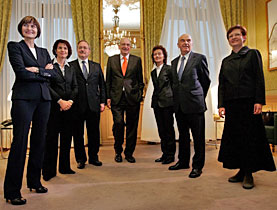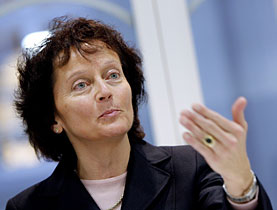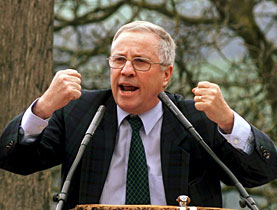Election shock upsets consensus politics

Parliament's ousting of the controversial justice minister, Christoph Blocher, appears to jeopardise a power-sharing agreement among the four main political parties.
Experts say Switzerland will face a period of uncertainty in the next few years, but it is not clear whether the rightwing People’s Party decision to go into opposition marks the end of a long-standing political practice.
By accepting election to the cabinet Eveline Widmer-Schlumpf on Thursday put paid to an informal power-sharing agreement. Some would even describe it as the end of a showpiece of Switzerland’s rock-solid political system.
The power-sharing deal, which falls short of a formal coalition, lasted for nearly five decades and included the centre-right Radicals, the Christian Democrats as well as the centre-left Social Democrats and Blocher’s People’s Party.
The term “opposition” will take on a new meaning, because the few small parties outside the government at present occupy less than 20 per cent of parliamentary seats.
The new role of the People’s Party did not come totally out of the blue and doesn’t mean there will be a radical change.
Double dealing
There were a number of indications over the past few years that the centre-left and the rightwing parties in government were finding it increasingly difficult to find common ground. The People’s Party in particular played a double game.
Represented by two ministers in the seven-member cabinet since 2003 it still acted as an opposition force, as evidenced in the run-up to October’s parliamentary elections.
“The People’s Party likes this role, as it has shown over the past 15 years. It has challenged laws and launched people’s initiatives, it has ridiculed politicians and even attacked one of its own ministers,” says Georg Lutz, a political scientist at Bern University.
The public humiliation of Blocher by the Social Democrats, the Christian Democrats and the Greens in the cabinet election prompted the People’s Party to announce it would go into opposition.
The move leaves Widmer-Schlumpf and Defence Minister Samuel Schmid, both members of the People’s Party, without the official support of their parliamentary group.

More
Consensus politics and power-sharing
Watershed
But it is not possible to say whether it marks a watershed in Swiss politics and a move towards a majority government and opposition system as in other countries.
“A new era has begun which will be marked by uncertainties. There is bound to be more competition, more polarisation. Personalities will play a bigger role. We can expect a phase of turbulence,” says Oscar Mazzoleni who teaches at the universities of Geneva and Lausanne.
The People’s Party is likely to flex its muscles as the main opposition force by using direct democracy and nationwide votes to challenge decisions by the government and parliament.
But it will have to use them with a measure of caution, according to Mazzoleni.
“The party risks losing the support of the business community if it systematically blocks the political system with referendums and people’s initiatives,” he says.
Limits
Andreas Ladner, political scientist at the Lausanne Graduate Institute of Public Administration, also sees the People’s Party having a limited impact in the role of opposition group.
“It’s a question of financial and personal resources in the long term. Whether the political system will be paralysed depends on the other parties too,” Ladner says.
“It is hard to see how some attempts at reform can be more stuck than they are now,” he adds.
There is little doubt that Blocher, free of any constraints and commitments as a cabinet minister, will use his financial means and powers of persuasion to attract new voters for his rightwing party.
“The defeat of Blocher will give the People’s Party a boost,” says Pascal Sciarini of Geneva University, “and the election of Widmer-Schlumpf could backfire on the other parties.”
The People’s Party will certainly be a headache for the Christian Democrats and the Radicals, according to Ladner.
“But even if support for Blocher hasn’t peaked, the party will have to think hard whether it wants to continue a policy of provocation. Parliament gave a clear message when it voted Blocher out,” he says.
“On the other hand, all the money in the world won’t be enough to win every voter in a democracy,” adds Lutz.
swissinfo, Armando Mombelli and Urs Geiser
The People’s Party, which had made its entry into the cabinet in 1929, won its second seat in the cabinet in 2003 when Christoph Blocher was elected at the expense of a Christian Democrat.
The Social Democrats won their first seat in 1943. But their representative withdrew three years later. In 1959 they were given two seats – marking the beginning of the so called Magic Formula.
The Radicals were the founding fathers of modern-day Switzerland in 1848 and held four out of seven seats in the cabinet for more than 40 years.
The Christian Democrats were the second party to enter the cabinet in 1891.
Christoph Blocher is only the fourth cabinet minister in Swiss history to fail to win re-election.
Usually it’s up to a cabinet minister to choose the moment to step down. Ministers are elected for a four-year term by parliament.
Eveline Widmer-Schlumpf is the third woman in the cabinet, joining Foreign Minister Micheline Calmy-Rey and Economics Minister Doris Leuthard.
Cabinet portfolios will be distributed after a meeting next week.
Parliament elected Interior Minister Pascal Couchepin as Swiss president for 2008 – a rotating and largely ceremonial post.

In compliance with the JTI standards
More: SWI swissinfo.ch certified by the Journalism Trust Initiative





You can find an overview of ongoing debates with our journalists here . Please join us!
If you want to start a conversation about a topic raised in this article or want to report factual errors, email us at english@swissinfo.ch.